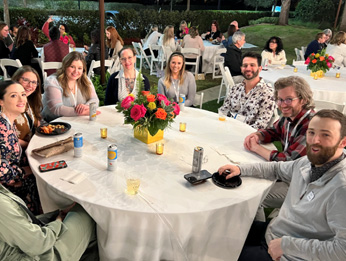


Practice: Abingdon Ear, Nose, and Throat Associates
Location: Abingdon, VA
Number of locations: 1
Number of employees: 20
www.AbingdonENT.com
1What inspired you to become an audiologist, and what do you love about your job?
It’s a combination of three things: I love music, I wanted to help people, and I grew up with my dad having a severe loss. It wasn’t until my third year of grad school that he finally got hearing aids. So, I was told for the first 15 years of my life that I mumbled and needed to speak up. Even now, I still talk loudly to everybody. It was only natural that I worked with people who had hearing loss.
We’re in a position to dramatically change people’s lives. I make people cry—a good cry—all the time during hearing aid demonstrations. I’ve had people tell me that they wish they got help for their hearing loss 20 years ago and that it completely changed their personality. When my patients tell me flattering things, I write them down. My favorite is, ‘I value my hearing aids more than I do my teeth.’
2Tell us a little about the practice and your professional background.
While I was at Syracuse [University], we had a lot of rotations in private practice and at the VA as well as a couple of school rotations. After graduating in 2019, I worked at SUNY [State University of New York] Downstate Medical Center in Brooklyn, which was a private practice within a hospital setting. So, I’ve been exposed to a lot of different environments. Abingdon has two ENT clinicians/doctors and two nurse practitioners. There’s also a large allergy department. It’s a very, very busy environment, especially for one audiologist.
3What’s it like working in an ENT setting versus a small audiology practice and are you happy you went into private practice?
In an ENT practice, there’s a lot of patients, but not that much time. In private practice, it’s reversed—there’s a lot of time but not as many patients. Also, a lot of the patients who walk through my door aren’t there for hearing loss—they think they’re coming in for something like wax removal or vertigo, but then their test results show they also have a serious sensorineural loss that needs to be treated.
Honestly, it’s the only type of job I would ever take. If you choose a job with more security like maybe a hospital position, then you have less freedom—you need to follow protocols, report to supervisors, etc. In private practice, you have more freedom when it comes to your clinical choices and pay. You’re also able to take even greater pride in the positive outcomes of your patients. But with that freedom also comes greater risks—YOU are the protocol, YOU are your supervisor, when something goes wrong it’s YOUR fault. Is it worth the risk and extra work? Yes, every day.
4So how do you handle the heavy workload? Any tips you can offer?
I used to be a waiter which probably shaped how I approach my current job. We used to say that, as a waiter, you need two things: speed and accuracy. You’ve got to do everything in a timely manner or else your waiting room is going to fill up. And in New York, patients will get mad at you because they have money in the meter. You also need consistency. You have to follow the same process, provide the same level of care, and you have to do it accurately because, well, why else are we here? Working in a fast-paced setting, I think it’s important to constantly ask yourself, ‘What’s the best use of my time right now?’ You have to make sure you’re taking care of yourself and your patients.
5How has CQ Partners helped make your job easier this past year and a half?
CQ Partners is like my personal trainer. They’ve helped me and my practice realize our full potential by showing us how to turn our ideas into realistic goals, then how to complete them. CQ’s recruiting department also just helped us hire an Audiology Assistant. It was like having a team of skilled agents helping us track down the right person. CQ’s recruiters posted the ad and fielded the applicants. Before the interviewees even walked into the clinic, they had already been screened and interviewed by two different recruiters. The process was easy, seamless, and it gave our clinic a lot of information about the potential hires that could have been overlooked otherwise. The new position will ultimately help us to grow our audiology department. There are many responsibilities—ordering devices, cleaning equipment, sending out device repairs, etc.—which can be completed by someone other than the audiologist. Having someone to handle those types of responsibilities will allow me to see and treat more patients.
6Are there any major changes you’ve seen in the industry in the past few years that you’ve been practicing?
Just in the last year, most of the insurances I work with no longer provide a monetary benefit. They’ve switched to providing benefits with a third-party payer. That means a patient will be able to get hearing aids at a discounted rate and it needs to be through a third-party group like Humana and TruHearing. Also, I’m increasingly seeing patients who purchased hearing aids online which is something I never saw when I was in school. I wish them luck and do my best to encourage them to come back to me.
7What do you think the industry and profession will look like in 20 years?
I see audiology staying viable but think we all need to get better at customer service and understand what exactly makes us valuable. That is specifically the fitting and maintenance of hearing aids, real ear measurements, validating hearing aid care, and aural rehabilitation. People will have even more options in how they obtain hearing aids. There will also be a lot more and better OTC [Over the Counter] products. All of these things should scare audiologists since selling hearing aids is how we’re able to stay in business. However, there will be a lot of patients who will purchase devices online, have them not work, and then need to be seen by an audiologist. If robots replace us by then, that means they’ve probably already started to replace many other medical professions, so we’ll all be in trouble. But I don’t think that will happen in our lifetimes.
8What advice would you give to audiology students or young audiologists who are just starting their careers?
First, ‘salesmanship’ is not a dirty word. With more and more hearing aids being sold directly to patients and for much cheaper, it’s important to understand what salesmanship is and how much overlap there is between a good salesman and a good counselor. Whether we like it or not, so much of what we do is presentation and customer service—these are all major elements of salesmanship. It wouldn’t be a bad idea to read a book by Phil Jones who writes specifically about audiology. He also has a lot of good online lectures that are free on YouTube. I think any employer would be impressed to hear a future employee’s thoughts on material like this and how it relates to our field.
Second, make a lot of mistakes in your fourth year and learn from them. Treat every day as if you were already on your own. If you do make a mistake, don’t be mad at yourself. Instead, be excited to learn from it and get better at what you do.
Third, always try to understand where your boss is coming from. Billing insurances and getting paid for your audiologic services can be like pulling teeth. Don’t be afraid to ask questions about reimbursement rates and what’s keeping the company viable. The business side of audiology is an increasingly uphill battle, so you want to make sure your interests are aligned with your clinic’s.
Lastly, whatever field of audiology you find yourself in, get really good at treatment and rehabilitation because that’s where you really help patients and how your clinic makes its money. A great mechanic is one who can fix a car and do it well, not one who can brilliantly explain what’s wrong with the car. In other words, you shouldn’t strive to be the greatest diagnostician that ever lived, but rather the greatest rehabilitator and treater. There’s a lot of customer service that goes into audiology. It not only matters what you say but how you say it and when you say it. That’s what will make you most valuable to your employer and, most importantly, your patients.








